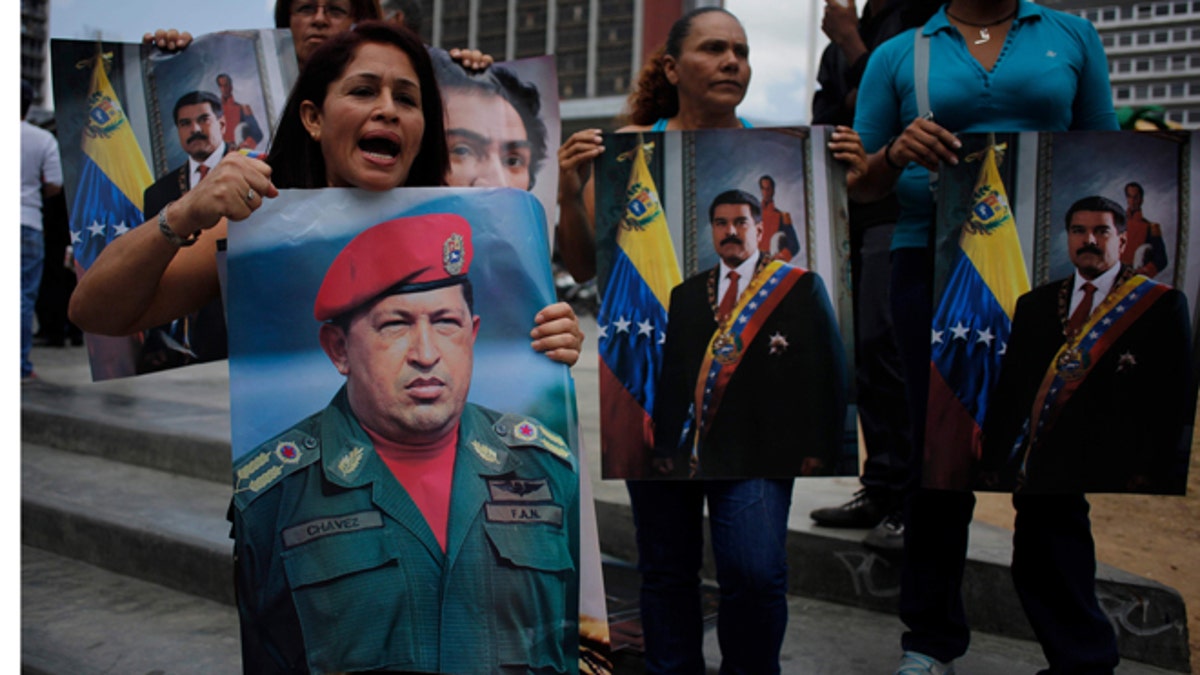
Supporters of Venezuela's President Nicolas Maduro, hold posters of him and of late Venezuelan President Hugo Chavez during a demonstration outside the Palace of justice in Caracas, Venezuela, Wednesday, Feb. 19, 2014. Following a dramatic surrender and a night in jail, Venezuelan opposition leader Leopoldo Lopez was due in court Wednesday to learn what charges he may face for allegedly provoking violence during protests against the socialist government in the divided nation. (AP Photo/Rodrigo Abd)
CARACAS, Venezuela (AP) – Hugo Chávez always said his socialist project would last decades, but a year after the Venezuelan president's death even some of his most fervent supporters are having their doubts.
The desperation of Venezuelans is growing along with the length of the queues outside state-run markets that reflect the economy's downward spiral and helped trigger a wave of protests in mid-February which have claimed more than a dozen lives.
"When the head of household is absent, as we say around here, things start to get out of control," said Pablo Nieves, a community leader in the poor 23 de Enero district of Caracas. "If he were still with us, it would have never gotten to this."
President Nicolás Maduro, the hand-picked successor of Chávez, organized 10 days of commemorative activities to mark Wednesday's anniversary of the larger-than-life leader's death from cancer at age 58.
A civilian-military parade is to be followed by speeches by allied presidents expected to include Evo Morales of Bolivia and Daniel Ortega of Nicaragua as well as the debut on state TV of director Oliver Stone's documentary "My Friend Hugo."
But while comrades may laud the man who transformed Venezuela during a 14-year reign by championing its poor, many don't agree with Nieves that Chávez could mend its compounding woes.
And many blame mismanagement by Chávez himself.
The opposition did not call any protests for Wednesday in the capital, though Foro Penal, which provides lawyers for detainees, did announce a march in the central industrial city of Valencia.
In a stalemate, the opposition is struggling to broaden its support base against the socialist government that rejects it as "putschist" and has been aided in repressing demonstrations by menacing "collectives" of motorcycle-riding thugs. The protesters blame the "collectives" for some of the 18 deaths the government says the unrest has reaped.
More than 1,000 protesters have been detained and 72 people face charges, including eight members of the SEBIN political police.
Maduro's government, meanwhile, has shown itself unable to halt 56 percent annual inflation and crippling currency controls that have fueled a growing scarcity of consumer basics — from milk to flour to cooking oil. The central bank's scarcity index was its highest-ever in January at 28 percent.
This nation with the world's largest proven oil reserves is becoming, to some, as destitute as Cuba, the socialist ally whose economy it helps prop up with oil shipments.
Former import-export and oil executives are driving cabs while workers from other collapsed industries struggle to find new lines of work.
Hugo Faundes studied culinary arts after being fired from the state-run oil company, PDVSA, for what he said were political reasons.
"Now that I've graduated there's nothing to cook," the Valencia man said with a dark laugh.
Tens of thousands have emigrated, and not just in search of economic opportunities. They flee one of the world's worst violent crime rates and a health care system nearing collapse.
Students have engaged National Guardsmen in the nearly nightly cat-and-mouse street battles since the unrest exploded Feb. 12. They've turned the wealthy Caracas district of Altamira into ground zero, honeycombing its center with debris barricades. But most protesters have been peaceful.
Maduro has tried to engage the opposition in a "peace dialogue" but it refuses, demanding he first release all political detainees, including top opposition leader Leopoldo Lopez, disarm the gangs that menace protesters and kick out the Cubans it claims pull the strings in the government and military.
The government, in turn, accuses the United States of fomenting the unrest and it kicked out three U.S. diplomats last month. That move followed a pattern: The day Chávez died, it kicked out two U.S. military attaches.
U.S. Secretary of State John Kerry has lamented that his government is being blamed for things he says it never did.
U.S. Rep. Gregory Meeks, a New York Democrat, has long praised Chávez's commitment to improving the lives of Venezuela's poor and attended his funeral. But Meeks planned to sit out the commemoration, saying he was "a little nervous" about events in Venezuela.
"There was always opposition, but when there were demonstrations in the streets in the past I never heard of individuals being killed by anybody in the government," he said. "It gives me real concerns as to where the country is headed."
Follow us on twitter.com/foxnewslatino
Like us at facebook.com/foxnewslatino






































